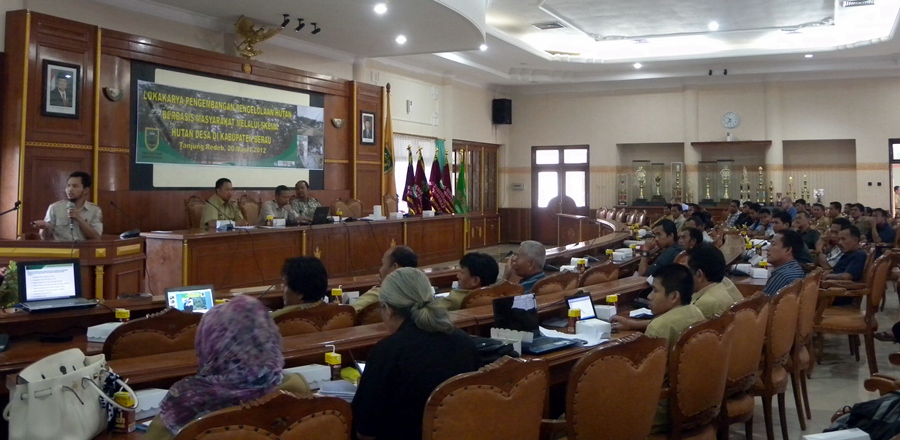FORCLIME
Forests and Climate Change ProgrammeTechnical Cooperation (TC Module)

Select your language


At a recent workshop on community based forest management in Berau District, East Kalimantan, participants committed to develop a roadmap for the development of community based forest management in the district for the period 2012-2015. With such a roadmap stakeholders will have a concrete plan and clear steps to follow which will range from dissemination of information on community based forest management schemes to facilitating the permitting process for specific village forests. The workshop, held in Berau on 20 March 2012, had been collaboratively organized by the Forest Service of Berau District, FORCLIME, The Nature Conservancy and a local NGO (Perkumpulan Jemari Alam Indonesia).
Around 60 participants attended the workshop from local government agencies, nongovernmental organizations, and universities as well as representatives from several villages in the surroundings of the Forest Management Unit (FMU) West Berau.
Development of village forest is one of the strategic objectives of the Ministry of Forestry as set out in the Medium-term Strategic Plan (RENSTRA 2010-2014). But also locally, the benefits of developing village forest are seen by decision-makers. “The orientation of forest management towards timber concessions in the past seems to not yet provide optimal benefit for the well-being of the people” stated the District Chief when he opened the workshop. And added his hope that by establishing community based forest management a better balance between environmental and social welfare objectives would be achieved. According to an indicative map presented by the Berau Forest Service an area as sizeable as 360.000 ha of protection forest and 32.000 ha of production forest has a high potential for the establishment of village forests. While the representative of the District Forest Service encouraged villages in these high potential areas to apply for village forest permits, representatives from central government committed to supporting the process by shortening bureaucratic procedures, supporting human resource development and integrating village nursery development into the village forest scheme.
The experiences of village forest developments from other regions confirmed that this kind of support, facilitation and capacity building is much needed for the development and success of village forests. According to WARSI, an NGO based in Jambi, assistance to local communities is necessary to introduce the concept of village forest, strengthening village institutions and help the community in the permitting process, and in forest management as well. Others stated that in villages where communities have strong ties to the forest, they manage forests using local wisdom as they are aware that managing forest sustainably is an assurance for their livelihood and to maintain their culture.
Berau District
Based on the potential of the region, according to the indicative mapping by the Berau Forest Service, shows that there are about 360,000 ha and 32,000 ha of protected forest and production forest, respectively, that potential to be managed through forest village scheme. Currently, oriented forest management in Berau is through concessionaires (IUPHHK), which considered provided less benefits for the local community welfare improvement. Through the village forest development is expected to achieve balance between environmental protection and local community welfare improvement aspects. Efforts to promote the village forest development in Berau are supported by the Berau Regent.
For the purpose of forest village development, the Ministry of Forestry provides best possible supports, such as shorten the bureaucracy for permitting process, development of human resources and so on. In addition, through Mahakam Watershed Management of Berau has also prepared several other activities that can be integrated in the forest village development, such as establishment of local community-based management nursery (Kebun Bibit Rakyat), activities of rehabilitation of forest and land, etc.
For more information, please contact:
Edy Marbyanto (edy.marbyanto@giz.de) or Ali Mustofa (ali.mustofa@giz.de)
From 21 March to 10 April FORCLIME is conducting a socio-economic survey of 16 forest villages in the surroundings of the Forest Management Unit (FMU) Berau Barat and planned REDD+ Demonstration Activities. The survey will collect data on: (1) the level of community well-being; (2) social data related to gender; (3) public perception on forests and REDD; and (4) community income and expenditures. The results will be used as baseline data to be able to evaluate the impacts of programme interventions and also to support the Forest Management Unit’s planning process.
Prior to the survey FORCLIME facilitated a training for the eleven enumerators from NGOs and local universities who are conducting the interviews. Participants were introduced to the theory of socio-economic baseline surveys and the concept of monitoring well-being using the Nested Sphere of Poverty (NESP) approach developed by CIFOR and already used by GIZ for several surveys in the past. The training also covered sampling and interview techniques, understanding the content of the questionnaire and how to organise the field work. In a simulation exercise the enumerators conducted interviews with each other using the questionnaire.
The socio-economic survey will be conducted in the following four sub-districts of Berau: Segah (8 villages), Kelay (5 villages), Sambaliung (1 village) and Teluk Bayur (2 villages). An international expert on socio economic surveying will visit several villages to collect additional data through in-depth interviews with community leaders and other key persons and will analyse the data collected by the enumerators.
For more information, please contact:
Edy Marbyanto (edy.marbyanto@giz.de) or
Helmut Dotzauer (helmut.dotzauer@giz.de)
 |
Supported By: |
  |